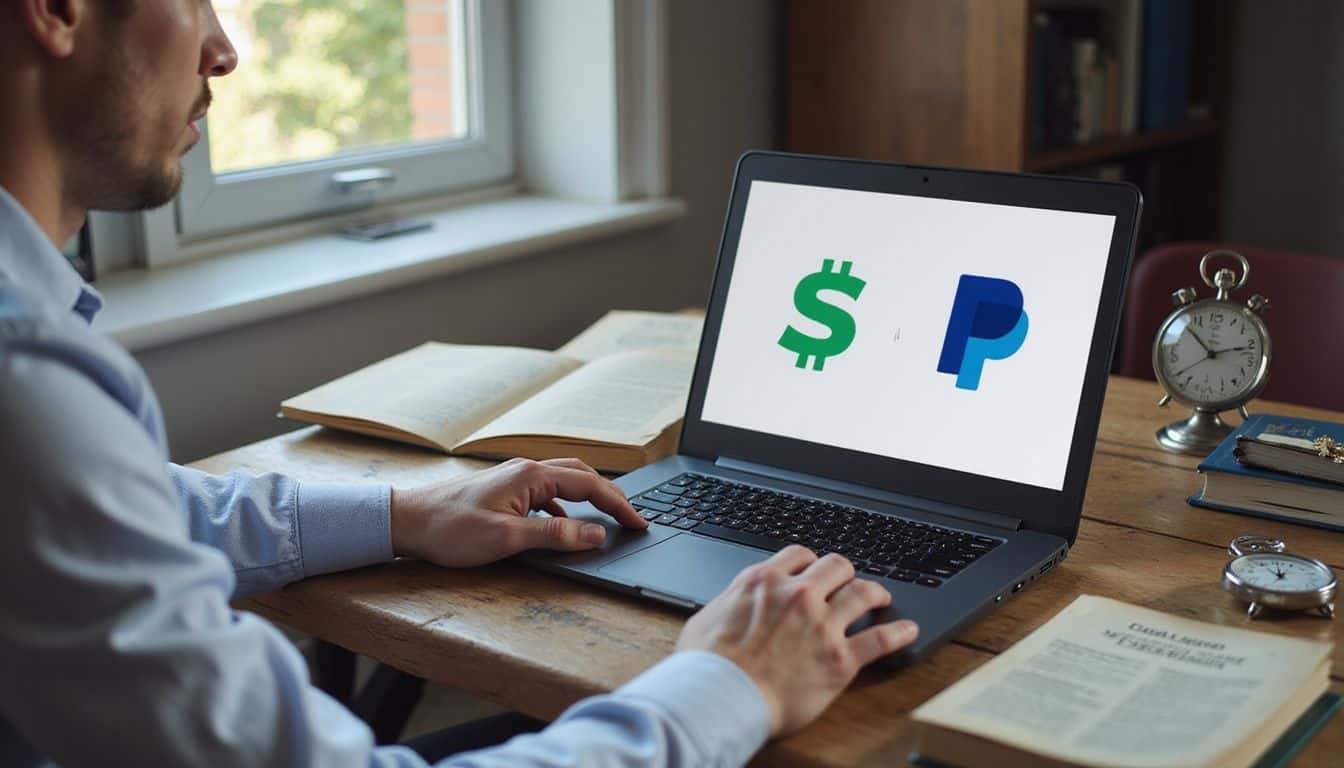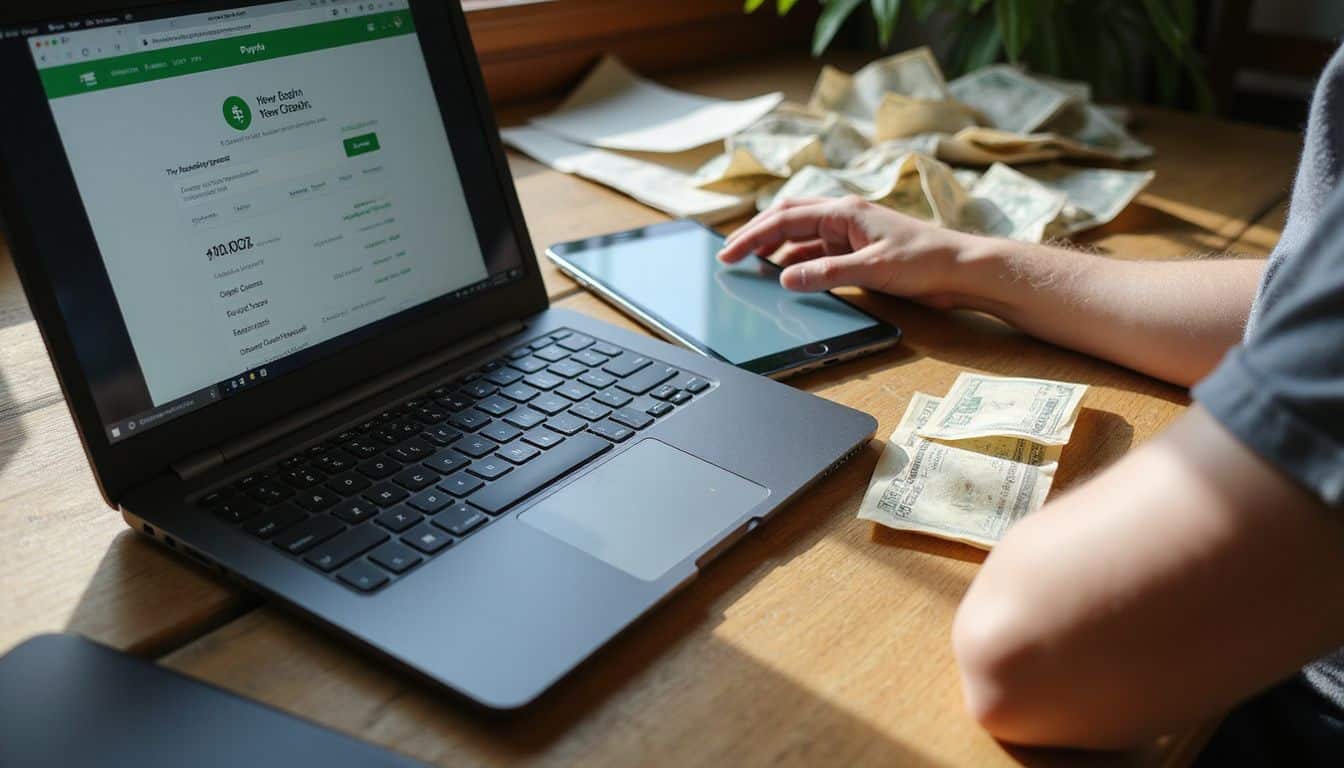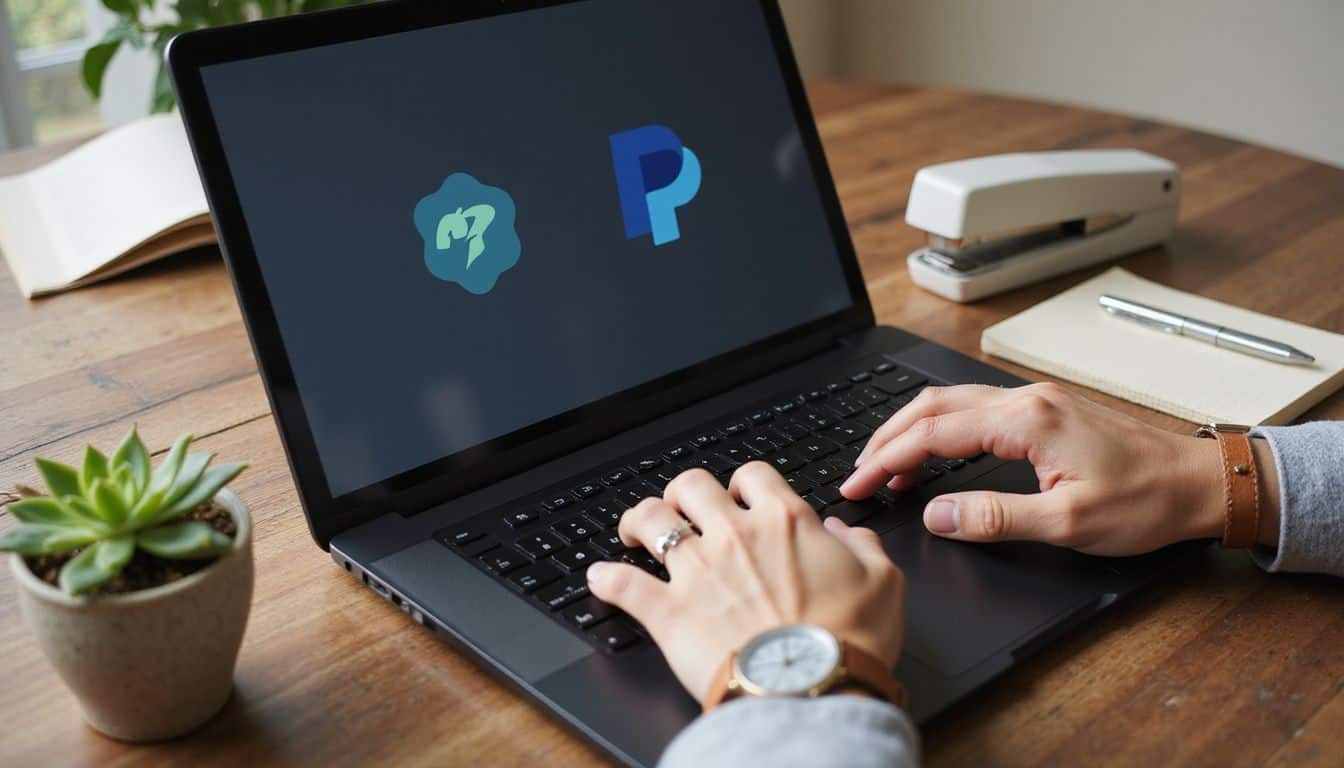Choosing between Cash App vs PayPal can feel confusing with their different features and fees. PayPal serves over 400 million users worldwide, while Cash App focuses mainly on the US and UK markets.
This guide breaks down their key differences in fees, transfer speeds, security features, and business tools to help you pick the right platform. You’ll discover which service matches your specific needs.
Key Takeaways
PayPal serves over 400 million users globally across 200+ countries, while Cash App focuses only on US and UK markets, making PayPal better for international transfers and business transactions with its support for 25 currencies and cross-border payments.
Cash App charges lower fees with a flat 2.75% for business payments and 0.5-1.75% for instant transfers, while PayPal charges 2.99-3.49% for business transactions and 1.5% for instant transfers, plus additional fees for international payments ranging from 3-5%.
Both platforms offer strong security through encryption and two-factor authentication, but PayPal provides extra buyer/seller protection features and dispute resolution services that Cash App lacks, making PayPal safer for online shopping and business transactions.
Cash App uniquely offers stock and Bitcoin trading starting at $1 investments with zero commission fees, while PayPal excels in business tools like invoicing, inventory management, and eCommerce integration with major platforms like Shopify and WooCommerce.
Standard transfers take 1-3 business days and are free on both platforms, but Cash App offers earlier access to direct deposits (up to 2 days faster) and includes a free debit card with ATM access, while PayPal focuses more on online payment processing and merchant services.
Table of Contents
Overview of Cash App and PayPal

Cash App and PayPal stand as major rivals in the digital payment space, with Cash App focusing on quick peer-to-peer transfers and crypto trading while PayPal excels in global e-commerce and business solutions.
Both platforms offer digital wallets, mobile payments, and bank transfers, yet they serve different primary markets – Cash App targets younger users in the U.S., while PayPal maintains a strong grip on international online shopping and merchant services.
What are the key features of Cash App?

The mobile payment app stands out with its unique blend of financial services. How does Cash App work? It brings together banking, investing, and digital payments in one platform.
- Direct deposit setup allows users to receive paychecks up to two days faster through the app’s banking features
- Stock investing starts at $1, letting users buy fractional shares of their favorite companies through the app
- Bitcoin trading enables quick cryptocurrency purchases and sales within the platform interface
- Free debit card (Cash Card) links to user accounts for ATM withdrawals and store purchases
- Instant peer-to-peer transfers happen with unique $Cashtag usernames for quick money sending
- Boost rewards program offers instant discounts at selected stores when using the Cash Card
- Two-factor authentication and PIN codes protect all transactions and account access
- QR code payments allow quick in-person transfers between users
- Account limits reach $10,000 per week for verified users, while unverified accounts can send $1,000 per month
- Bank transfers move money between Cash App and linked bank accounts without fees
- Mobile check deposits let users add paper checks through their phone camera
- Business profiles enable merchants to accept payments and track sales separately from personal transactions
- Cross-border transfers work between US and UK users with real-time exchange rates
- Digital wallet storage keeps payment methods and transaction history organized
What are the key features of PayPal?

PayPal stands as a global leader in digital payments with features that serve both personal and business users. Its platform processes transactions in over 100 currencies while offering strong security measures.
- Money transfers happen instantly between PayPal accounts, with free domestic transfers using linked bank accounts
- Buyer and seller protection covers purchases against fraud, damaged items, or items not received up to full value
- Business tools include invoicing, payment processing, and point-of-sale systems through PayPal Zettle
- International payments support over 100 currencies with real-time currency conversion rates
- Multiple funding sources link to accounts, including credit cards, debit cards, and bank accounts
- Online checkout integration works with major shopping cart platforms and custom websites
- Mobile app enables QR code payments, contactless transactions, and quick money transfers
- Two-factor authentication and encryption protect all financial data and transactions
- Direct deposit feature allows early access to paychecks up to two days faster
- Buy Now, Pay Later service splits large purchases into smaller payments without interest
- Business loans and working capital options help merchants grow their operations
- Automated subscription and recurring payment management for businesses
- Digital wallet stores payment methods securely for fast online shopping
- Dispute resolution center handles transaction issues and customer claims
- Cash back rewards program offers benefits on eligible purchases
Fees and Costs

Money moves differently through Cash App and PayPal, with each platform setting its own rules for fees. Users need to know the exact costs of sending, receiving, and converting money before picking their preferred payment app.
What are the transaction fees for Cash App and PayPal?

Understanding transaction fees between Cash App and PayPal helps users make smart choices for their digital payments. Each platform offers distinct fee structures for various services.
| Transaction Type | Cash App Fees | PayPal Fees |
|---|---|---|
| Standard P2P Transfers | Free | Free (using balance/bank) |
| Credit Card Payments | 2.75% | 2.9% + fixed fee |
| Instant Transfers | 0.5% – 1.75% | 1.5% |
| Business Payments | 2.75% flat rate | 2.99% – 3.49% |
| International Transfers | N/A (US-UK only) | 5% + currency conversion |
| ATM Withdrawals | $2 (free with salary deposit) | N/A |
| Bank Account Withdrawals | Free | Free (standard) / 1.5% (instant) |
Cash App maintains simpler fees with most services staying free. Standard transfers cost nothing on both platforms. PayPal charges varied rates based on payment types and locations. Business users face higher fees on PayPal compared to Cash App’s flat rate. International payments through PayPal incur extra costs for currency conversion.
How much do currency conversion fees cost?

Currency conversion fees vary between Cash App and PayPal for international money transfers. Each platform applies different rates and calculation methods.
| Fee Type | Cash App | PayPal |
|---|---|---|
| Standard Currency Conversion | Mid-market exchange rates (USD to GBP only) | 3% to 4% of transaction amount |
| International Payment Base Fee | No base fee | 5% of transaction amount |
| Cross-Border Money Transfer | Available only between US and UK | 4% for sending to different currencies |
| Business Transaction Fee | Not applicable | 3.4% + fixed fee based on currency |
| Instant Transfer Fee | 1.5% for instant transfers | 1% for instant transfers (max $10) |
| Standard Bank Transfer | Free | Free |
PayPal charges higher fees for international transactions. The total cost includes a base fee plus conversion charges. Cash App offers better rates through mid-market pricing between USD and GBP transfers. Standard bank transfers remain free on both platforms. Smart users often compare rates before making large international transfers.
Are there any withdrawal fees?

Moving from currency conversion costs, let’s examine the withdrawal fees for both payment platforms.
Different withdrawal methods carry specific fees across these popular payment apps.
| Platform | Withdrawal Type | Fee |
|---|---|---|
| Cash App | Standard Bank Transfer | Free (1-3 business days) |
| ATM Withdrawal (with direct deposit) | Free | |
| Out-of-network ATM | $2.50 | |
| PayPal | Standard Bank Transfer | Free (1-3 business days) |
| Instant Transfer | 1.5% of transfer amount | |
| Check Request | $1.50 per check | |
| Zelle | All Transfers | Free |
Availability and Accessibility

PayPal serves users in over 200 countries with full support on Android, iOS, and web browsers. Cash App limits its services to the US and UK markets but offers smooth performance across mobile devices and desktop platforms.
Which countries support Cash App and PayPal?
Digital payment platforms have changed how people send money worldwide. Cash App and PayPal serve different geographic markets with distinct features and limitations.
- Cash App limits its services to users in the United States and United Kingdom. The app supports money transfers only between these two countries through its mobile banking platform.
- American users must stay within the US to use Cash App. The app blocks access for US citizens who live in other countries, even with a valid US bank account.
- PayPal works in over 200 countries and supports 25 currencies. Users can send electronic payments across borders through their checking accounts or debit cards.
- The US and UK markets get full Cash App features like direct deposits, stocks trading, and Bitcoin buying. These special tools don’t exist for users in other regions.
- PayPal accepts payments in most major global markets through various methods. Users can link credit cards, bank accounts, and digital wallets to send or receive funds.
- Cash App requires a US phone number and address for account creation. UK users must provide local details to access the British version of the service.
- Small businesses worldwide use PayPal for online stores and pos systems. The platform processes payments in local currencies with real-time exchange rates.
- Both apps use two-factor authentication and pin codes for security. These safety features work the same way across all supported countries.
- PayPal offers business accounts in most nations with tools for invoicing and subscriptions. Cash App focuses on personal transfers in its two main markets.
What platforms and devices are compatible?
Both Cash App and PayPal offer distinct platform compatibility options for users. The apps serve different device ecosystems with varying levels of access and functionality.
- Cash App runs exclusively on iOS and Android mobile devices through dedicated apps from the Apple App Store and Google Play Store
- PayPal works across multiple platforms including desktop computers, laptops, tablets, and smartphones through web browsers
- Cash App’s mobile focus limits desktop access, while PayPal offers full website functionality on computers
- PayPal integrates with most major web browsers like Chrome, Firefox, Safari, and Edge
- Both apps support QR code scanning through smartphone cameras for quick payments
- PayPal offers a business app separate from its main consumer app for merchant services
- Cash App requires iOS 13.0 or later for Apple devices and Android 6.0 or higher for Android phones
- PayPal’s mobile apps need iOS 12.0+ or Android 5.0+ to function properly
- Both services provide mobile-responsive websites that adapt to different screen sizes
- Cash App lacks a desktop application, focusing solely on mobile experiences
- PayPal maintains dedicated point-of-sale hardware compatibility for business users
- Both platforms support integration with digital wallets like Apple Pay and Google Pay
- Cash App works with most ATMs for cash withdrawals using their Cash Card
- PayPal connects with various eCommerce platforms and shopping carts for online stores
- Both services offer secure login through fingerprint and face recognition on compatible devices
Payment and Transfer Options

Cash App and PayPal offer different ways to send and receive money through their platforms. Both services support instant transfers between users, bank accounts, and cards with unique features for personal and business transactions.
How do peer-to-peer transfers work on each platform?
Peer-to-peer transfers make sending money to friends and family quick and simple. Both Cash App and PayPal offer distinct methods for moving money between users.
- Users link their bank accounts or debit cards to start transfers on either platform, with instant processing available through both apps.
- PayPal transfers happen through email addresses or phone numbers, letting users send up to unlimited amounts after account verification.
- Money moves instantly between Cash App users through unique $Cashtags or phone numbers, with a $1,000 monthly limit for unverified accounts.
- Direct bank transfers on PayPal take 1-3 business days and cost nothing, while instant transfers charge 1% of the total amount.
- The Friends and Family option on PayPal skips fees if users pay with their PayPal balance or linked bank account.
- Two-factor authentication protects transfers on both platforms, requiring a PIN code or fingerprint scan to approve payments.
- QR code scanning allows quick transfers between users who are physically near each other on both apps.
- International transfers work only through PayPal, supporting payments to multiple countries with varying fees.
- Both platforms encrypt transfer data and monitor for suspicious activity to prevent fraud.
- Mobile apps for both services show real-time transfer status and send notifications when money arrives.
- Direct deposits clear faster through Cash App, often arriving two days earlier than traditional bank transfers.
What business payment options are available?
Business owners need reliable payment solutions for their daily operations. Both Cash App and PayPal offer distinct features for commercial transactions.
- PayPal provides invoicing tools that let merchants bill customers and track payments through a single dashboard. Users can create custom invoices with their business logo and payment terms.
- Cash App for Business accounts enables quick QR code payments at physical stores. Store owners scan customer codes to receive instant payments without card readers.
- PayPal’s Business-to-Business transfers support high-value transactions up to $60,000 per payment. This feature serves larger enterprises needing to move substantial funds.
- Cash App’s $1,000 monthly limit on unverified accounts makes it better suited for small businesses and micro-merchants. Verified accounts can process higher amounts.
- PayPal offers eCommerce integration with major platforms like Shopify and WooCommerce. Merchants can add PayPal checkout buttons to their online stores.
- Cash App provides free business debit cards that work at any Visa-accepting location. The cards allow instant access to received payments.
- PayPal’s chargeback protection helps businesses fight fraudulent payment disputes. This system shields merchants from unauthorized refund claims.
- Cash App’s direct deposit feature lets businesses receive customer payments straight to their linked bank accounts. The funds clear within 1-3 business days.
The speed of transactions plays a crucial role in business operations, so let’s examine how fast each platform processes payments.
What payment methods do Cash App and PayPal support?
Both Cash App and PayPal offer diverse payment options to suit different user needs. These digital payment platforms process millions of transactions daily through various payment methods.
- Cash App accepts direct bank transfers from linked accounts with instant deposits available for a 1.5% fee. The app processes up to $1,000 monthly for unverified accounts.
- Users can link debit cards to Cash App for free instant transfers. The platform supports most major debit card issuers including Visa, Mastercard, and American Express.
- PayPal accepts credit cards from all major providers, with standard processing fees of 2.9% plus $0.30 per transaction. Adding gift cards to PayPal expands payment flexibility.
- Bank transfers through PayPal remain free between users in the same country. Verified PayPal accounts can send between $10,000 to $60,000 per transaction.
- Cash App provides a free customizable debit card that links directly to your balance. Users can withdraw cash at ATMs with a $2 fee.
- PayPal Credit serves as a digital credit line for purchases. This feature lets users pay over time with no interest if paid within 6 months on purchases of $99 or more.
- QR code payments work on both platforms for contactless transactions. Scanning merchant QR codes triggers instant payments from linked payment methods.
- Two-factor authentication protects all payment methods on both apps. Users must verify their identity before adding new payment sources.
- Direct deposits arrive up to two days early with Cash App. The service supports paycheck deposits and government payments without fees.
- PayPal supports international payments in over 200 countries. Currency conversion fees apply at 2.5% above market rates.
Speed of Transactions

Both Cash App and PayPal process domestic transfers within minutes, while international transfers through PayPal can take 1-3 business days – read on to learn which platform matches your speed needs.
How fast are domestic transfers?
Domestic transfer speeds vary between Cash App and PayPal based on the transfer type and fee structure. Standard transfers take 1-3 business days on both platforms.
| Transfer Type | Cash App | PayPal |
|---|---|---|
| Instant Transfer | Immediate (0.5% – 1.75% fee) | Immediate (1.75% fee) |
| Standard Transfer | 1-3 business days (free) | 1-3 business days (free) |
| Bank Account to App | Instant | 3-5 business days |
| Debit Card to App | Instant | Instant |
| Credit Card to App | Not supported | Instant (2.9% + $0.30 fee) |
| Maximum Speed Available | Instant | Instant |
What is the speed for international transfers?
International money transfers vary between Cash App and PayPal, with each platform offering distinct processing times and fee structures.
| Feature | Cash App | PayPal |
|---|---|---|
| Transfer Speed | Instant (US to UK only) | Instant for verified accounts |
| Geographic Coverage | Limited to US-UK transfers | 200+ countries supported |
| Currency Conversion | Mid-market rates apply | 4% conversion fee |
| International Fees | Standard transfer fees | 5% per transaction |
| Processing Time Factors | Bank verification, amount | Account status, destination |
PayPal maintains a clear advantage with its broader global reach and instant transfer capabilities. The platform processes international payments quickly across its vast network. Cash App delivers rapid transfers between the US and UK through its mid-market rate system. Both services excel in different areas of international transfers, making the choice dependent on specific user needs. Security measures play a crucial role in protecting these rapid international transfers.
Security and Fraud Protection

Both Cash App and PayPal pack strong security features with encryption, two-factor authentication, and fraud monitoring systems that protect your money and data – read on to learn which platform offers better protection for your specific needs.
How do Cash App and PayPal protect data with encryption?
Cash App and PayPal prioritize user security through advanced encryption protocols. These digital payment platforms use end-to-end encryption to protect sensitive data during transactions.
The encryption technology scrambles user information into unreadable code, making it impossible for hackers to access personal details. PayPal offers extra purchase protection features for goods transactions, while Cash App uses a unique $Cashtag system to keep personal information private.
Security measures on these platforms go beyond basic encryption. Each service follows strict PCI data security rules to guard user transactions. Two-factor authentication adds an extra layer of protection against unauthorized access.
Users must verify their identity through a second method, like a text message code or fingerprint scan. The next section explores the speed of transactions on Cash App and PayPal.
What fraud prevention features are offered?
Strong encryption serves as the foundation for both apps’ security measures. Each platform takes fraud prevention seriously through distinct security features.
- PayPal’s Resolution Center handles transaction disputes and offers purchase protection for “Goods & Services” payments, making it ideal for business transactions.
- Two-factor authentication acts as a standard security feature on both platforms, requiring users to verify their identity through multiple steps.
- Users can freeze their Cash Card instantly through the app if they spot suspicious activity or lose their card.
- PayPal monitors all transactions 24/7 with automated systems that flag unusual patterns or potential fraud attempts.
- The “Outsmarting scams” guide in Cash App teaches users about common fraud tactics and prevention methods.
- Both services use automated and manual review processes to detect and prevent unauthorized account access.
- QR code payments add an extra layer of security by generating unique codes for each transaction.
- Pin codes protect user accounts on both platforms, with options to set custom security preferences.
- PayPal’s seller protection covers eligible business transactions against chargebacks and fraudulent claims.
- Two-step verification requires users to input a unique code sent to their phone before completing sensitive actions.
- Digital receipts track all transactions, making it easier to spot and report unauthorized payments.
- Both apps use real-time alerts to notify users about account activity and potential security threats.
User Experience and Interface

Cash App and PayPal both offer clean, simple interfaces with tap-to-pay features, direct deposit options, and quick money transfers – read on to learn which platform matches your needs.
Are these apps easy to use for beginners?
Beginners prefer Cash App’s simple design over PayPal’s complex interface. Users rate Cash App higher due to its clear layout and quick money-sending features. The $cashtag system makes transfers easy by removing the need for contact details.
Many first-time users master Cash App’s basic functions within minutes.
PayPal offers more services but creates confusion for new users through its packed menu system. The platform includes business tools, invoicing options, and international transfers that can overwhelm beginners.
The app’s built-in guide about scams helps users stay safe while learning the basics. Most newcomers need extra time to understand PayPal’s full range of features compared to Cash App’s straightforward approach.
What accessibility features do they provide?
User-friendly interfaces make both apps simple to navigate. These digital payment platforms offer various accessibility options to help all users manage their money.
- Voice commands support on Cash App and PayPal works with screen readers for visually impaired users
- Large text options and high contrast modes enhance readability across both platforms
- PayPal offers keyboard shortcuts for quick navigation without using a mouse
- Cash App’s $cashtag system lets users send money without typing long account details
- Both apps feature clear, simple layouts with minimal clutter and easy-to-spot buttons
- Touch ID and Face ID login options make access quick for users with mobility challenges
- PayPal provides multi-language support in over 25 languages
- Cash App includes in-app tutorials and help guides with visual aids
- Both platforms support one-handed operation through thumb-friendly button placement
- Color-blind friendly design schemes ensure all users can distinguish important elements
- Text-to-speech compatibility works across all major mobile operating systems
- Quick-access menus reduce the number of taps needed to complete tasks
- Both apps allow custom font size adjustments to match user preferences
- Emergency contact options provide direct access to support services
Additional Features

Cash App and PayPal pack extra tools beyond basic transfers – Cash App lets you buy stocks and Bitcoin right from your phone, while PayPal offers business tools like invoicing and online store integration.
Want to learn which platform fits your needs? Keep reading to explore their unique strengths.
How does Cash App’s Bitcoin and stock trading work?
Bitcoin and stock trading on Cash App brings investment options right to your phone screen. Users can start investing with as little as $1 through the app’s straightforward interface.
- Stock trading happens instantly through direct market access, with zero commission fees on trades.
- Users tap the investing tab to view real-time stock prices and market data before making trades.
- The platform supports fractional share purchases, letting users buy portions of expensive stocks.
- Automatic recurring investments help users build their portfolio through scheduled stock purchases.
- Bitcoin purchases require identity verification through a valid ID and selfie upload.
- The app shows live Bitcoin price updates and allows instant BTC purchases using linked bank funds.
- Two-factor authentication protects all trading activities through pin codes and biometric locks.
- Users can transfer Bitcoin to external wallets or sell it back to USD within the app.
- Direct deposits of paychecks can automatically convert a percentage into Bitcoin or stocks.
- The investing interface displays clear profit/loss tracking and portfolio performance metrics.
- Educational resources teach basic trading concepts through in-app guides and tutorials.
- Quick withdrawal options let users transfer investment gains to their linked bank accounts.
- Price alerts notify users about significant market movements in their watched stocks.
- The platform maintains FDIC insurance on USD balances up to $250,000 per user.
What invoicing and eCommerce tools does PayPal offer?
Moving beyond Cash App’s trading features, PayPal stands out with its extensive business tools. PayPal offers a complete suite of professional invoicing and eCommerce solutions that help businesses manage their financial operations.
- PayPal’s invoice creator allows users to make detailed bills with custom logos, item descriptions, and tax calculations
- The platform includes ready-to-use payment buttons that merchants can add to their websites in minutes
- Users can create QR codes for contactless payments at physical stores or events
- The shopping cart feature integrates with major eCommerce platforms like Shopify and WooCommerce
- PayPal Zettle works as a complete point-of-sale system for brick-and-mortar stores
- The recurring billing system helps set up automatic payments for subscriptions
- Smart payment buttons adjust to show local payment methods based on customer location
- The platform accepts multiple payment types including credit cards, debit cards, and PayPal Credit
- Businesses can track expenses and generate financial reports through the merchant dashboard
- The checkout system works across desktop and mobile devices with automatic optimization
- Developer tools and APIs allow custom integration with existing business software
- The platform offers digital marketing tools to help businesses reach more customers
- Seller protection covers eligible transactions against fraud and chargebacks
- The system includes inventory management tools to track stock levels
- Built-in currency conversion handles international sales automatically
Business Use Comparison

Cash App and PayPal both offer distinct business tools – Cash App focuses on simple payment solutions for small vendors, while PayPal provides advanced features like detailed analytics, inventory management, and multi-user access that make it ideal for growing companies.
Want to know which platform suits your business needs better? Keep reading to discover their specific strengths and limitations.
What tools are available for small businesses?
Small businesses need reliable digital payment tools to grow their operations. Both PayPal and Cash App offer specific features for business users, though their capabilities differ significantly.
- PayPal’s invoicing system lets merchants create and send professional bills to customers with a 2.9% + $0.30 fee per transaction
- Business profiles on PayPal include detailed sales reports, inventory tracking, and tax calculation tools
- Direct integration with major e-commerce platforms allows PayPal merchants to sell through websites like Shopify and WooCommerce
- Cash App’s business toolkit charges a flat 2.75% fee on all payments, making it simpler to calculate costs
- QR code payments through both platforms enable quick in-person transactions without special hardware
- PayPal offers dispute resolution services and seller protection for qualified transactions up to $60,000
- Digital receipts and transaction histories help businesses track sales and manage accounting
- PayPal’s cross-border payment support serves international customers with currency conversion options
- Business debit cards from both services provide instant access to received funds
- Automated payment scheduling helps manage recurring bills and subscriptions
- Real-time fraud monitoring protects business accounts from unauthorized access
- Two-factor authentication adds extra security for sensitive financial data
- Mobile apps allow businesses to process payments and check accounts on the go
- Direct deposit features speed up access to business funds
- Online banking integration simplifies fund transfers between business accounts
How scalable are these platforms for larger enterprises?
Large enterprises need reliable payment platforms that can handle global transactions. Both Cash App and PayPal offer distinct scaling capabilities for growing businesses.
- PayPal supports operations in over 200 countries, making it ideal for international business expansion and cross-border payments.
- Cash App limits business operations to the US and UK markets, which restricts global growth potential for large companies.
- PayPal allows higher transaction limits for verified business accounts, supporting large-scale financial operations and bulk payments.
- Cash App caps unverified account transfers at lower amounts, creating barriers for high-volume enterprise transactions.
- PayPal provides advanced APIs and developer tools that integrate with major enterprise resource planning systems.
- Cash App offers basic business features suited for small operations but lacks extensive enterprise-level integration options.
- PayPal’s merchant services include point-of-sale systems, payment gateways, and mass payout capabilities for large workforces.
- Cash App’s direct deposit and instant transfer features work well for small teams but face limitations with large employee bases.
- PayPal’s fraud protection and dispute resolution systems scale effectively for enterprises handling thousands of transactions.
- Cash App’s security features focus on individual transactions rather than enterprise-wide protection needs.
- PayPal connects with multiple payment processors and banking systems worldwide, supporting complex business operations.
- Cash App partners with fewer financial institutions, limiting payment options for large-scale business needs.
Customer Support

Cash App and PayPal each offer different support options – Cash App focuses on automated help through its app and website, while PayPal provides phone, email, and chat support with real agents available 24/7 to solve your payment issues fast.
What support channels does Cash App provide?
Support options for Cash App users remain limited compared to other digital payment platforms. Users can access several basic support channels through the mobile application.
- The main support hub exists inside the Cash App through a dedicated help section with FAQs and troubleshooting guides
- Email support allows users to submit detailed questions about their accounts or transactions, though response times vary
- In-app request submissions let users report specific issues directly through their mobile devices
- A self-service knowledge base provides articles about common problems, security tips, and basic account management
- Direct messaging support works only for users in the United States and United Kingdom
- The app features a special security center that teaches users about avoiding scams and protecting their accounts
- Support representatives handle issues through asynchronous messaging rather than real-time phone calls
- Users can find quick answers through automated chatbot responses for basic questions
- The mobile app includes a built-in issue reporting tool for flagging suspicious activities
- Social media channels offer limited support through direct messages on Twitter and Facebook
- The help section contains video tutorials showing step-by-step solutions to frequent problems
- A dedicated fraud reporting system allows users to flag unauthorized transactions quickly
How can users contact PayPal support?
PayPal offers multiple channels for users to get help with their accounts and transactions. The platform maintains a dedicated support system to handle various user concerns through its website and mobile app.
- Users can access PayPal’s Resolution Center directly from their account dashboard to report transaction problems or disputes
- The PayPal app features a built-in chat function for quick answers to basic questions about payments and account settings
- Direct phone support is available 24/7 through PayPal’s toll-free number for urgent account issues or high-value transactions
- Email support tickets can be submitted through the PayPal website with response times averaging 24-48 hours
- The PayPal Community Forum connects users with expert members who can answer common questions
- Social media support runs through verified PayPal accounts on Twitter and Facebook for general inquiries
- Users can schedule video calls with PayPal specialists for complex account or business-related matters
- Two-factor authentication helps verify user identity before connecting with customer service
- The PayPal Help Center contains searchable articles and guides for self-service problem solving
- Business users receive priority support through dedicated account managers for transaction volumes over $100,000
- Users can track their support tickets through the PayPal website or mobile app for status updates
- The automated virtual assistant provides instant responses for basic account questions and common issues
User Reviews and Feedback

Users praise Cash App’s quick setup and PayPal’s broad merchant acceptance, while both platforms face mixed feedback about customer service response times – read on to learn which platform suits your needs better.
What strengths do users highlight?
Cash App stands out with its impressive ratings of 4.6 on Google Play and 4.7 on the Apple App Store. The app’s $cashtag system makes money transfers simple without sharing private details.
Many people praise its zero-fee structure for sending and receiving funds through debit cards. The platform’s teen-friendly accounts with parent controls appeal to families looking for safe digital payment options.
PayPal shines through its global merchant acceptance and strong buyer protection features. The platform excels in online shopping security through two-factor authentication and pin codes.
Small business owners value PayPal’s direct deposit options and QR code payments for in-store transactions. The platform’s fraud protection measures give customers peace of mind during digital transactions.
What are common complaints from users?
Users report both positive and negative experiences with these payment platforms. The complaints deserve equal attention to make an informed choice.
PayPal users express frustration over high fees, especially for credit card payments and international transfers. The platform’s currency conversion costs lack transparency, leading to unexpected charges.
Many Cash App users struggle to reach customer service during urgent issues. The $1,000 monthly limit on unverified Cash App accounts creates problems for users who need to transfer larger amounts.
Security remains a major concern across both platforms. Users note gaps in fraud protection despite features like two-factor authentication and pin codes. Cash App’s limited availability outside the US and UK frustrates international users who want to send money to family abroad.
Pros and Cons

Both Cash App and PayPal offer unique benefits and drawbacks in digital payments – read on to discover which platform matches your specific needs.
What are the advantages of Cash App?
Cash App stands out with its instant payment features and zero fees for basic transfers. Users enjoy quick access to funds through the Cash Card, a customizable debit card that works at any ATM.
The app’s clean interface makes money management simple for users of all ages, including teens who want to start handling digital payments.
The platform offers unique investment opportunities through its stock trading and Bitcoin features. Square’s digital wallet lets users buy fractional shares of stocks with as little as $1, making investing accessible to everyone.
The flat 2.75% fee structure for business transactions keeps costs clear and predictable. The two-factor authentication and QR code payments provide strong security measures that protect every transaction.
What are the disadvantages of Cash App?
Cash App provides several advantages, but it has significant restrictions users should be aware of. The app only works in the US and UK markets, limiting its usefulness for international money transfers.
Users have strict monthly sending limits of $1,000 unless they verify their account. The platform doesn’t have strong dispute protection features, which may leave users more vulnerable to potential fraud risks and transaction issues.
The app charges additional fees for credit card transactions and instant bank deposits, which can accumulate over time. Users can’t deposit checks or cash directly through the app, unlike PayPal’s more flexible deposit options.
The platform also lacks key features such as bill-splitting tools and advanced business functions. These restrictions make it less appropriate for complex financial needs or growing businesses that require more comprehensive payment solutions.
What are the advantages of PayPal?
PayPal stands out as a global payment giant with its massive reach across most countries. Users enjoy high transaction limits of up to $60,000 for verified accounts, making it perfect for large purchases or business deals.
The platform offers free personal transfers through linked bank accounts, while its two-factor authentication keeps money safe from hackers. Small business owners benefit from PayPal’s built-in invoicing tools and “buy now, pay later” options that help boost sales.
PayPal’s flexibility sets it apart from other payment apps. The service works with multiple payment methods, including debit cards, credit cards, and bank transfers. Business users get access to detailed financial reports, inventory tracking, and professional invoicing templates.
The platform’s fraud protection shields both buyers and sellers through encrypted transactions and dispute resolution services. These features make PayPal an excellent choice for online merchants who need reliable payment processing and strong security measures.
What are the disadvantages of PayPal?
PayPal’s high fees create major drawbacks for users. Credit card transactions cost 2.9% plus a fixed fee, while currency conversions add 3% to 4% to each international transfer. The instant transfer service to bank accounts charges 1.75% with a minimum fee of $0.25.
These costs stack up fast for regular users who make frequent transfers or run small businesses.
The platform lacks strong protection for personal money transfers unless marked as purchases. The user interface feels outdated compared to modern digital payment apps. Many users report frustration with the complex menu system and slow loading times.
The age restriction blocks anyone under 18 from creating an account, which limits its use for families. The two-factor authentication process often causes login delays, though it helps prevent fraud.
Which is Better for Specific Use Cases?

Cash App and PayPal serve different needs based on your payment goals. PayPal excels at business transactions and online shopping, while Cash App shines for quick peer-to-peer transfers and stock investments.
Which app is better for personal use?
PayPal and Cash App each serve different personal needs for digital payments. PayPal excels in online shopping and global transactions with broader acceptance worldwide. The platform offers strong buyer protection and supports larger transaction limits for verified accounts.
Users can make secure purchases across millions of websites with PayPal’s trusted payment system.
For daily peer-to-peer transfers and family use, Cash App stands out with its free personal transactions and teen account options. The app features a simple interface that appeals to both tech-savvy users and beginners.
Users can send money instantly through $cashtags without sharing personal details. The customizable debit cards and direct deposit options make Cash App ideal for managing everyday expenses and splitting costs with friends.
Which app is better for business use?
Business owners need PayPal’s extensive global reach and diverse tools for their operations. The platform offers advanced features like detailed invoicing, comprehensive reporting, and varied payment options.
Small businesses can process international transactions with better reliability due to PayPal’s wide acceptance across borders. The flat fee structure of Cash App stands at 2.75% for business deals, while PayPal uses a flexible fee system based on transaction types.
Cash App serves basic business needs through its simple interface but lacks key features for larger companies. The app misses crucial tools like professional invoicing and detailed financial reports.
Many small business owners prefer PayPal because it works in more countries and offers stronger fraud protection. The platform also connects well with online stores and provides better customer support options for business accounts.
How Will Cash App and PayPal Evolve in 2025?

Cash App plans major updates to attract users who find technology challenging. The app will roll out simpler navigation menus and clearer instructions for money transfers. Users can expect stronger security features with enhanced two-factor authentication and pin codes.
The platform aims to expand its cryptocurrency and stock trading options for tech-savvy customers. These changes will make Cash App more competitive against other digital payment platforms.
The app will also add new tools for families to manage shared expenses and set spending limits for children.
PayPal focuses on building trust through advanced security measures in 2025. The platform will upgrade its fraud detection systems to protect users from online scams. The company will improve its interface with modern features like QR code payments and instant transfers.
PayPal aims to make international transfers faster and cheaper through partnerships with global banks. The platform will strengthen its position in online shopping with better integration for small businesses.
Direct deposit options and digital wallet features will expand to match newer payment apps.
People Also Ask
What are the main differences between Cash App and PayPal’s transfer fees?
Cash App offers free peer-to-peer (P2P) transfers between users, while PayPal charges competitive rates for certain transactions. Both platforms support debit and credit card payments with varying fees.
How do security features compare between these digital payment platforms?
Both services use two-factor authentication (2FA), PIN codes, and QR codes for security. PayPal and Cash App are regulated by the Financial Conduct Authority and offer fraud protection for users.
Can I get a debit card with both services?
Yes, both digital wallet services provide debit cards. Cash App’s card is issued by Block, Inc. (formerly Square, Inc.), while PayPal offers its own branded card for direct access to funds.
Which platform handles direct deposits better?
Both services process direct deposits efficiently. Cash App often delivers payments up to two days earlier, while PayPal integrates with more financial institutions through Early Warning Services.
How do their customer service options differ?
PayPal provides more customer service channels and typically receives higher review ratings. Cash App offers support through their app and website but has fewer contact options.
Which platform works better for online money transfers?
PayPal leads in online money transfers with broader international coverage and exchange rates. Cash App excels in domestic transfers but has limited international features. Both platforms are insured by the Federal Deposit Insurance Corp.
